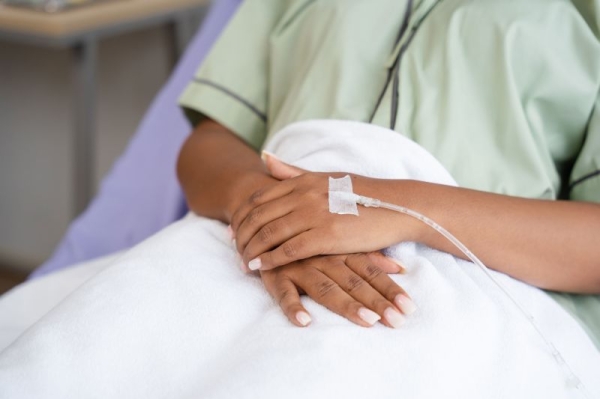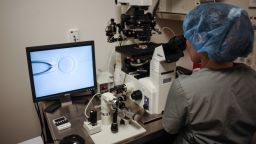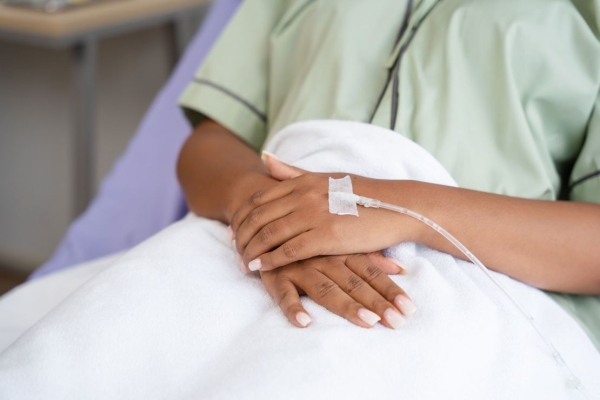
In the wake of the overturning of Roe v. Wade, more young adults in the United States took pregnancy off the table entirely, new research has shown.
In Dobbs v. Jackson Women’s Health Organization in 2022, the US Supreme Court overturned the 1973 high court decision that gave abortion federal protection. Since then, many states have partially or completely limited access to abortion.
In a study that included 113 million people in all four US Census regions, researchers found that since the reversal, both vasectomies and tubal ligations — sometimes called having your tubes tied — increased significantly in people ages 18 to 30.

An embryologist is seen at work at the Virginia Center for Reproductive Medicine, in Reston, Virginia on June 12, 2019 – Freezing your eggs, getting pregnant after the age of 50, choosing the baby’s sex: when it comes to in-vitro fertilization and other assisted reproduction procedures in the United States, would-be parents are spoilt for choice. This isn’t the case in many other countries, including France, which is hoping to pass legislation that would let single women and lesbian couples benefit from these technologies for the first time. (Photo by Ivan Couronne / AFP) / TO GO WITH AFP STORY by Ivan COURONNE, “In US, relaxed IVF laws help would-be parents realize dreams” (Photo by IVAN COURONNE/AFP via Getty Images) Ivan Couronne/AFP/Getty Images
Tubal ligation procedures increased twice as much as vasectomies, according to the study published Friday in JAMA Health Forum.
“Findings from this research highlight the indirect effects of Dobbs on the reproductive autonomy of young people,” said lead study author Dr. Jackie Ellison, assistant professor of health policy and management at the University of Pittsburgh School of Public Health.
The “findings also demonstrate how abortion restrictions disproportionately impact women and people who can get pregnant,” she said in an email.
The data was examined on a national level, which means it could not take into account the differences in states with stricter abortion restrictions, said Ellison, who is also faculty in the university’s Center for Innovative Research on Gender Health Equity.
“The increase likely reflects fear or anxiety among young people about restricted access to abortion and/or contraception,” she added.
“In the short term, we need to ensure access to affordable, person-centered contraceptive care. People need access to the full range of contraceptive methods, including permanent contraception,” Ellison said.

The pressure young people may be feeling to avoid having children is worrying, experts said. Twenty47studio/Moment RF/Getty Images
Pressure both ways
The study noted that the increase in these procedures involving female anatomy were twice those involving male anatomy, which experts said was not surprising.
“Pregnancy impacts the person with the uterus who has to carry the pregnancy to term,” said Dr. Kristen Mark, a professor of sexual health education at the University of Minnesota Medical School. “It makes sense that they would be more likely to take this into their own hands and make this decision.”
Mark was not involved in the research.
Both the impacts of pregnancy and the responsibilities of parenting often fall largely on the pregnant person, Ellison said.
“It may seem obvious, but it’s important to emphasize that cisgender men may not feel the same sense of urgency to undergo vasectomy because they don’t experience the same consequences of unwanted pregnancy,” she added.
A big problem is that women and people who can become pregnant often face the pressure both ways: to get the procedure and to avoid it, said Dr. Elisabeth Gordon, a sexual health psychiatrist based in New York City. Gordon did not participate in the research.
Many doctors push back when patients, particularly younger people, come in asking for a tubal ligation, Mark said.

Mifepristone (Mifeprex) and Misoprostol, the two drugs used in a medication abortion, are seen at the Women’s Reproductive Clinic, which provides legal medication abortion services, in Santa Teresa, New Mexico, on June 17, 2022. Mifepristone is taken first to stop the pregnancy, followed by Misoprostol to induce bleeding. – In the wake of Friday’s ruling by the US Supreme Court striking down Roe v Wade and the federally protected right to an abortion, women from Texas and other states are traveling to clinics like the Women’s Reproductive Health Clinic in New Mexico for legal abortion services under the state’s more liberal laws. – RESTRICTED TO EDITORIAL USE (Photo by Robyn Beck / AFP) / RESTRICTED TO EDITORIAL USE (Photo by ROBYN BECK/AFP via Getty Images) Robyn Beck/AFP/Getty Images
It’s important that doctors make sure patients understand what goes into their procedures, Gordon said. But once a doctor knows a patient has thoroughly considered the options, they should take them at their word, she added.
“There is more questioning when women go into this, and that certainly is rooted in patriarchy,” Gordon said.
The pressure to take decisive steps not to get pregnant and the pressure against the very same thing can put people in a position in which their choices are influenced by factors other than what is right for them, Mark said.
“Here we’re seeing bodily autonomy being threatened in a different way,” she said.
Even though young women are more likely to experience sterilization regret, they need to be trusted and supported in their contraceptive decision-making.
Not making the decision because of Dobbs
More people getting these procedures isn’t inherently concerning, Gordon said.
“What I have concerns about is the climate in which these choices are being made,” she said.
Vasectomies and tubal ligation are common and relatively safe procedures, but the decision to get them should not be rushed by a feeling of pressure or fear around unintended pregnancy, Mark said.
“We have a lot of options available for effective contraceptive methods that are not permanent,” she added.
Patients may still decide that permanent contraception is right for them, but Gordon urges them to talk with providers of the procedures first to make sure they understand what is involved, that it’s permanent and that they still need to protect against risks to sexual health.
“I would prefer people not feel pressured to have to make this choice,” Gordon said. “I would prefer to have them make it in a supportive environment in which medicine and science and the individual are being put first.”

